i am picking list of names from database, according to scenario each name exists many times in database, That's ok. Now i have filled a DROPDOWNLIST with those names but in drop down list each name appears several times:

but i want to display each name 1 time in DROPDOWN. I have used distict() but not working.
USING MVC 3, Linq to SQL
Controller:
namespace EmployeeAttendance_app.Controllers
{
public class HomeController : Controller
{
EmployeeAtdDataContext DataContext = new EmployeeAtdDataContext();
public ActionResult Index()
{
ViewBag.Message = "Precise Technology Consultants";
//var EmployeeAtd = DataContext.GetAttendance_Sp();
IEnumerable<GetAtdRecord_SpResult> EmployeeAtd = DataContext.GetAtdRecord_Sp(null).ToList();
var names = (from n in DataContext.EmployeeAtds select n).Distinct();
//ViewData["EmplID"] = new SelectList(names, "EmplID", "EmplName");
return View(EmployeeAtd);
}
public ActionResult ddl()
{
var names = (from n in DataContext.EmployeeAtds select n).Distinct();
ViewData["EmplID"] = new SelectList(names, "EmplID", "EmplName");
return View();
}
public ActionResult showDDL(string EmplID)
{
ViewBag.EmplID = EmplID;
return View();
}
public ActionResult About()
{
return View();
}
Views:
@{
ViewBag.Title = "ddl";
}
<h2>ddl</h2>
@using (Html.BeginForm("showDDL", "Home", FormMethod.Get))
{
<fieldset>
Employers
@Html.DropDownList("EmplID", "Select Name")
<p>
<input type="submit" value="Submit" />
</p>
</fieldset>
}
ModeL
amespace EmployeeAttendance_app.Models
{
using System.Data.Linq;
using System.Data.Linq.Mapping;
using System.Data;
using System.Collections.Generic;
using System.Reflection;
using System.Linq;
using System.Linq.Expressions;
using System.ComponentModel;
using System;
[global::System.Data.Linq.Mapping.DatabaseAttribute(Name="a1")]
public partial class EmployeeAtdDataContext : System.Data.Linq.DataContext
{
private static System.Data.Linq.Mapping.MappingSource mappingSource = new AttributeMappingSource();
#region Extensibility Method Definitions
partial void OnCreated();
#endregion
public EmployeeAtdDataContext() :
base(global::System.Configuration.ConfigurationManager.ConnectionStrings["a1ConnectionString"].ConnectionString, mappingSource)
{
OnCreated();
}
public EmployeeAtdDataContext(string connection) :
base(connection, mappingSource)
{
OnCreated();
}
public EmployeeAtdDataContext(System.Data.IDbConnection connection) :
base(connection, mappingSource)
{
OnCreated();
}
public EmployeeAtdDataContext(string connection, System.Data.Linq.Mapping.MappingSource mappingSource) :
base(connection, mappingSource)
{
OnCreated();
}
public EmployeeAtdDataContext(System.Data.IDbConnection connection, System.Data.Linq.Mapping.MappingSource mappingSource) :
base(connection, mappingSource)
{
OnCreated();
}
public System.Data.Linq.Table<EmployeeAtd> EmployeeAtds
{
get
{
return this.GetTable<EmployeeAtd>();
}
}
[global::System.Data.Linq.Mapping.FunctionAttribute(Name="dbo.GetAtdRecord_Sp")]
public ISingleResult<GetAtdRecord_SpResult> GetAtdRecord_Sp([global::System.Data.Linq.Mapping.ParameterAttribute(Name="EmplID", DbType="Int")] System.Nullable<int> emplID)
{
IExecuteResult result = this.ExecuteMethodCall(this, ((MethodInfo)(MethodInfo.GetCurrentMethod())), emplID);
return ((ISingleResult<GetAtdRecord_SpResult>)(result.ReturnValue));
}
}
[global::System.Data.Linq.Mapping.TableAttribute(Name="dbo.V_EmployeeAtd")]
public partial class EmployeeAtd
{
private string _EmplID;
private string _EmplName;
private string _RecDate;
private string _RecTime;
private string _DeptName;
public EmployeeAtd()
{
}
[global::System.Data.Linq.Mapping.ColumnAttribute(Storage="_EmplID", DbType="Char(8) NOT NULL", CanBeNull=false)]
public string EmplID
{
get
{
return this._EmplID;
}
set
{
if ((this._EmplID != value))
{
this._EmplID = value;
}
}
}
[global::System.Data.Linq.Mapping.ColumnAttribute(Storage="_EmplName", DbType="NVarChar(40) NOT NULL", CanBeNull=false)]
public string EmplName
{
get
{
return this._EmplName;
}
set
{
if ((this._EmplName != value))
{
this._EmplName = value;
}
}
}
[global::System.Data.Linq.Mapping.ColumnAttribute(Storage="_RecDate", DbType="Char(10)")]
public string RecDate
{
get
{
return this._RecDate;
}
set
{
if ((this._RecDate != value))
{
this._RecDate = value;
}
}
}
[global::System.Data.Linq.Mapping.ColumnAttribute(Storage="_RecTime", DbType="Char(5)")]
public string RecTime
{
get
{
return this._RecTime;
}
set
{
if ((this._RecTime != value))
{
this._RecTime = value;
}
}
}
[global::System.Data.Linq.Mapping.ColumnAttribute(Storage="_DeptName", DbType="NVarChar(50)")]
public string DeptName
{
get
{
return this._DeptName;
}
set
{
if ((this._DeptName != value))
{
this._DeptName = value;
}
}
}
}
public partial class GetAtdRecord_SpResult
{
private string _EmplID;
private string _EmplName;
private string _InTime;
private string _OutTime;
private string _DateVisited;
private string _TimeWorked;
private string _OverTime;
public GetAtdRecord_SpResult()
{
}
[global::System.Data.Linq.Mapping.ColumnAttribute(Storage="_EmplID", DbType="Char(8) NOT NULL", CanBeNull=false)]
public string EmplID
{
get
{
return this._EmplID;
}
set
{
if ((this._EmplID != value))
{
this._EmplID = value;
}
}
}
[global::System.Data.Linq.Mapping.ColumnAttribute(Storage="_EmplName", DbType="NVarChar(40) NOT NULL", CanBeNull=false)]
public string EmplName
{
get
{
return this._EmplName;
}
set
{
if ((this._EmplName != value))
{
this._EmplName = value;
}
}
}
[global::System.Data.Linq.Mapping.ColumnAttribute(Storage="_InTime", DbType="Char(5)")]
public string InTime
{
get
{
return this._InTime;
}
set
{
if ((this._InTime != value))
{
this._InTime = value;
}
}
}
[global::System.Data.Linq.Mapping.ColumnAttribute(Storage="_OutTime", DbType="Char(5)")]
public string OutTime
{
get
{
return this._OutTime;
}
set
{
if ((this._OutTime != value))
{
this._OutTime = value;
}
}
}
[global::System.Data.Linq.Mapping.ColumnAttribute(Storage="_DateVisited", DbType="Char(10) NOT NULL", CanBeNull=false)]
public string DateVisited
{
get
{
return this._DateVisited;
}
set
{
if ((this._DateVisited != value))
{
this._DateVisited = value;
}
}
}
[global::System.Data.Linq.Mapping.ColumnAttribute(Storage="_TimeWorked", DbType="Char(5)")]
public string TimeWorked
{
get
{
return this._TimeWorked;
}
set
{
if ((this._TimeWorked != value))
{
this._TimeWorked = value;
}
}
}
[global::System.Data.Linq.Mapping.ColumnAttribute(Storage="_OverTime", DbType="VarChar(6)")]
public string OverTime
{
get
{
return this._OverTime;
}
set
{
if ((this._OverTime != value))
{
this._OverTime = value;
}
}
}
}
}

